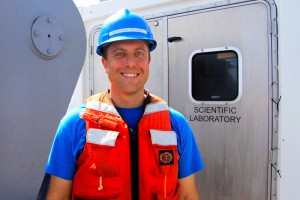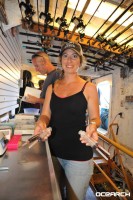Mote Welcomes Two Ph.D. Scientists
Mote Marine Laboratory is proud to announce the arrival of Dr. Heather Marshall and Dr. Paul Suprenand — two outstanding additions to the world-class team of Ph.D. scientists central to Mote's guiding blueprint, the 2020 Vision & Strategic Plan. (Read the Plan: https://mote.org/about-us.)
Both were awarded competitive Mote Postdoctoral Research Fellowships, which provide two years of funding support for postdoctoral (Ph.D.-holding) scientists conducting outstanding work early in their careers. Each Mote Postdoctoral Research Fellow is mentored by a Mote scientist. The Fellowships are part of Mote’s mission to foster the next generation of leading marine researchers.
Dr. Heather Marshall will study shark physiology — particularly the stress of being caught and released on fishing gear. She has been fascinated with shark physiology since she interned at Mote 10 years ago. “The Mote internship cemented my interest in shark research — I got to meet many scientists, try many different fishing techniques and work with several shark species,” Marshall said.
Originally from New Jersey, she earned her bachelor’s degree from Smith College in Northampton, Mass. and earned her master’s and doctoral degrees from the University of Massachusetts, Dartmouth, focusing her doctoral thesis on how stress of being captured on commercial fishing gear affects shark physiology and survival.
“It’s really important to understand the stress sharks experience when being caught, because it can influence survival and be a significant factor affecting the status of certain shark populations — and many shark species respond to capture differently,” Marshall said. “Sharks play important roles in their ecosystems, often as top predators. If a lot of sharks perish after capture and release, then we may see detrimental effects that trickle down to other species. The more we understand the stress physiology of sharks, the better we can maintain shark fisheries for future generations.”
On the way to completing her doctorate in 2014, Marshall took on the research experience of a lifetime: She helped study great white sharks during expeditions led by the organization OCEARCH off Cape Cod, Mass., and Jacksonville, Fla. She was invited aboard by a scientist from the Massachusetts Division of Marine Fisheries to analyze blood samples, and there she worked alongside two of Mote’s shark experts, Dr. Robert Hueter and Dr. Nick Whitney. She later studied shark blood and helped others learn how during OCEARCH expeditions off the Galapagos Islands and Chile. “Blood samples are minimally invasive and they can tell you a lot about the health status of an animal.”
During a great white shark expedition off Cape Cod in September 2014, she received a callback about her application for the Mote Fellowship. “A Mote staff member called to say that Mote’s President, Dr. (Michael P.) Crosby wanted to speak with me, right while we had a white shark by the boat,” Marshall said. “I was trying to hear over the noise of the ship machinery and activity. I promised to be available later that day, and when Dr. Crosby told me I’d been selected for the fellowship, I was over the moon.”
Marshall said she greatly admires Mote’s founder, “Shark Lady” Dr. Eugenie Clark, and she is grateful to join Mote’s Center for Shark Research — the only such center designated by U.S. Congress. “As a scientist, I see Mote as world-renowned, and since my internship I’ve dreamed of returning,” Marshall said. “Mote is closely involved with its community and with the diverse fisheries in Florida. I’m honored to be a part of this group.”
As a Mote scientist, Marshall hopes to return to the Galapagos Islands in early 2015 and study Galapagos sharks and tiger sharks, continuing to conduct and train others in blood sampling and analysis. There she will focus on fishing-related stress and survival, along with feeding habits.
Marshall's mentor at Mote is Dr. Nick Whitney, Manager of Mote's Behavioral Ecology and Physiology Program. Whitney has more than 15 years of experience working with large marine vertebrates with a specialty in studying the movements and behavior of sharks in the wild.
At Mote’s home base in Sarasota, Marshall hopes to support science education with The Gills Club — a free monthly gathering especially focused on girls who love marine science — which was co-founded in January 2014 by a group including Marshall and Cynthia Wigren, founder of the Atlantic White Shark Conservancy in Cape Cod.
Dr. Paul Suprenand will study how environmental contaminants could affect marine life and humans in the Arctic.
Using mathematical modeling, he hopes to forecast how oil spills in Alaska could affect multiple marine species along with at-risk human communities — such as Inuits who traditionally harvest large marine mammals, fish and invertebrates.
Suprenand was born in Colorado and earned his bachelor’s and master’s degrees at University of Colorado at Boulder and Colorado School of Mines, respectively. He earned his doctorate from University of South Florida, studying how snails called pteropods can help reveal environmental change along the western Antarctic Peninsula.
Suprenand, who calls himself “warm-blooded to the extreme,” tested his mettle during his Antarctic research by swimming in the Southern Ocean wearing a standard bathing suit. “When I was growing up, I earned a youth badge from the local Polar Bear Club,” he said.
His interest in chilly environments helped fuel his outstanding scientific career. Suprenand was declared the 2014-2015 International Arctic Science Committee Fellow and has attended meetings in Finland and Sweden, and he plans to attend a 2015 meeting in Japan. He was also among 60 people selected from around the globe to participate in the 2014 ClimECO4 IMBER workshop in China, and the 2012 ClimECO3 in Turkey. IMBER, or Integrated Marine Biogeochemistry and Ecosystem Research, is an international project working to understand and better predict how environmental change will affect the oceans. Suprenand also co-led a Chief Scientist Training Cruise for the University-National Oceanographic Laboratory System from Barbados to Bermuda. These cruises, funded in part by the National Science Foundation, instruct early-career marine scientists on conducting research at sea.
As a Mote scientist, Suprenand hopes to travel to Alaska in summer 2015 and gather data about local marine life for developing and running mathematical models. Key animal groups to focus on may include bottom-dwelling organisms like shellfish, which can be vulnerable to oil in sediments, fish at multiple levels of the water column and marine mammals such as seals, which may eat contaminated prey and store oil compounds in their body fat. Human communities that harvest these animals may also be at risk.
Suprenand’s mentor is Dr. Dana Wetzel, manager of the Environmental Laboratory for Forensics at Mote, an expert on oil and other organic contaminants in marine ecosystems. He will also work with other Mote scientists on projects about various marine species and geographic regions.
“It’s quite wonderful to be here at Mote,” Suprenand said, “With all of the great projects going on here, it will be a challenge to do everything I want to do at once.”

